Cape San Pío at 55°3′S66°31′W, the southernmost tip of mainland Isla Grande de Tierra del Fuego as well as of Argentina, except for the small islet Islote Blanco that lies about 1.5 kilometres (0.93 mi) off the coast in SW direction.

Cape Bojeador Lighthouse, also known as Burgos Lighthouse, is a cultural heritage structure in Burgos, Ilocos Norte, that was established during the Spanish colonial period in the Philippines. The lighthouse was first lit on March 30, 1892, and is set high on Vigia de Nagpartian Hill overlooking the scenic Cape Bojeador where early galleons used to sail by. After over 100 years, it still functions and serves ships that enter the Philippine archipelago from the north and guide them safely away from the rocky coast of the town.
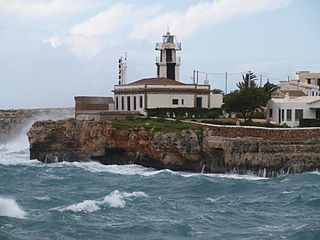
The Ciutadella, Punta de Sa Farola or Sa Farola Lighthouse is an active 19th century lighthouse on the Spanish island of Menorca. Originally completed in 1863, the tower has subsequently undergone a number of modifications. It lies close to the seaward entrance of the port of Ciutadella on the Sa Farola point, at the western end of the island. On the opposite headland is the Castell de Sant Nicolau, a 17th-century defensive tower.

The Maspalomas Lighthouse is an active 19th century lighthouse at the southern end of the Spanish island of Gran Canaria, in the Canary archipelago. It lies at one end of the Maspalomas beach, 4 kilometres (2.5 mi) south of the resort town centre, next to the area known as the Maspalomas Dunes.

The Punta Martiño Lighthouse is an active lighthouse on the Canary island of Lobos, near Fuerteventura in the municipality of La Oliva.
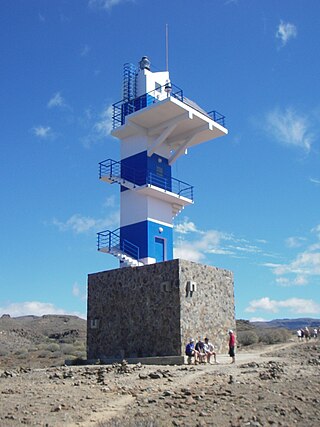
The Punta del Castillete Lighthouse is an active lighthouse on the Canary island of Gran Canaria. It is located on cliffs above the resort and fishing harbour of Puerto de Mogán, in the municipality of Mogán. Punta Castillete is on the south-western side of the island facing the Atlantic Ocean, and lies between Maspalomas Lighthouse to the south and the lighthouse of Punta Sardina to the north.

Punta Cumplida Lighthouse is an active 19th century Spanish lighthouse on the Canary island of La Palma in the municipality of Barlovento. Punta Cumplida is the oldest of the four main lighthouses on La Palma, each one being located near to a different cardinal point of the island. Punta Cumplida marks the north-eastern tip; Fuencaliente the southern point, and the two modern lighthouses at Punta Lava and Arenas Blancas, the eastern and western points respectively.
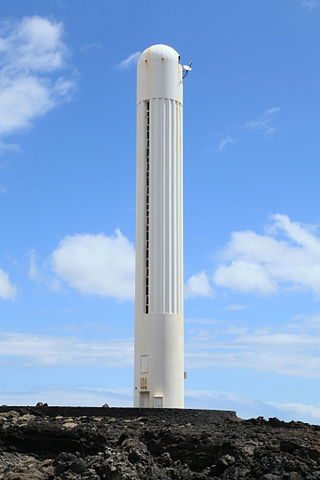
The Arenas Blancas Lighthouse is an active lighthouse on the Canary island of La Palma in the municipality of Villa de Mazo, near the village of La Salemera. The larger settlement of Mazo lies 8 km (5.0 mi) to the north-west.
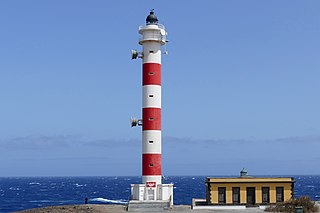
The Punta Abona Lighthouse is an active lighthouse on the south-eastern coast of Tenerife in the Canary islands. It is located between Abades and Poris de Abona, in the municipality of Arico. The lighthouse was the second to be constructed on the rocky headland of Punta Abona, which marks the south-east side of the island, and lies between the Punta de Anaga Lighthouse to the north and the Punta Rasca Lighthouse of Arona to the south.

The Puerto del Rosario Lighthouse also known as the Punta Gaviota Lighthouse is a modern active lighthouse on the Canary island of Fuerteventura. It is located in an industrial area at the north-eastern end of the town of Puerto del Rosario, the capital and major port of the island in the Province of Las Palmas.

The Punta Rasca Lighthouse is an active lighthouse in the municipality of Arona on the Canary Island of Tenerife. The current lighthouse was the second to be constructed on the headland of Punta Rasca, which is located close to the most southerly point on the island at Punta Salemas. It lies between the Punta Abona Lighthouse to the northeast and the Punta de Teno Lighthouse of Buenavista del Norte to the northwest.

The Punta de Teno Lighthouse is an active lighthouse in the municipality of Buenavista del Norte on the Canary Island of Tenerife. The current lighthouse was the second to be constructed on the narrow rocky headland of Punta de Teno, which is the most westerly point on the island. It is one of seven lighthouses which mark the coastline of Tenerife, and lies between the Punta Rasca Lighthouse to the southeast, and the modern lighthouse of Buenavista to the northeast.

The Punta de Arinaga Lighthouse is an active lighthouse on the Spanish island of Gran Canaria in the Canary islands. The current lighthouse tower is the third to be constructed on the rocky headland of Punta Arinaga, near the town of the same name in the municipality of Agüimes. Arinaga is on the south-east side of the island and marks the coastline between the Maspalomas lighthouse to the south and the Punta de Melenara lighthouse of Telde to the north.

La Isleta Lighthouse is an active 19th century lighthouse on the Spanish island of Gran Canaria in the Canary islands. The lighthouse has been constructed on the rocky peninsula of La Isleta, which overlooks the Port of Las Palmas to the north of the city of Las Palmas, the capital of Gran Canaria. Situated at the north-eastern tip of the island, the La Isleta light marks the approaches to the port and lies midway between the Sardina lighthouse to the east and the Punta de Melenara lighthouse of Telde to the south.

The San Cristóbal Lighthouse is an active lighthouse on the Spanish island of La Gomera in the Canary islands. The current lighthouse is the second to have been constructed on the rocky headland of Punta de San Cristóbal, on the eastern side of the island, overlooking the approaches to San Sebastián de La Gomera, the main port and capital of La Gomera.
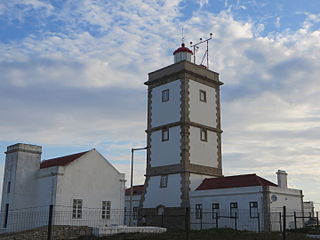
The Lighthouse of Cabo Carvoeiro is an active lighthouse in the civil parish of Peniche, municipality of the same name, in the Portuguese district of Leiria.

Punta Lava Lighthouse is an active 20th century Spanish lighthouse on the Canary island of La Palma. It is located in the municipality of Tazacorte, near the village of La Bombilla on the western side of the island. The larger settlement of Puerto Naos lies 2 kilometres to the south-west.

Cabo Prior Lighthouse is an active 19th century Spanish lighthouse located on the cabo, or cape, of the same name in the parish of San Martiño de Covas in the Ferrol municipality of the Province of A Coruña, Galicia. The lighthouse has been constructed on a high coastal clifftop, some 14 kilometres (8.7 mi) northwest of Ferrol. A set of steps descends from the lighthouse down the steep cliff to a viewpoint overlooking the Atlantic Ocean.

Cape Espichel Lighthouse is situated on the western coast of the civil parish of Castelo, municipality of Sesimbra, in the Setúbal district of Portugal. The lighthouse was built in 1790.

The Boujdour lighthouse is a lighthouse located near Cape Bojador in the city of Boujdour in the Laâyoune-Sakia El Hamra region of Morocco. The Boujdour lighthouse became a historical monument in the southern provinces of Morocco after the annexation of Western Sahara to Morocco in 1976.




















